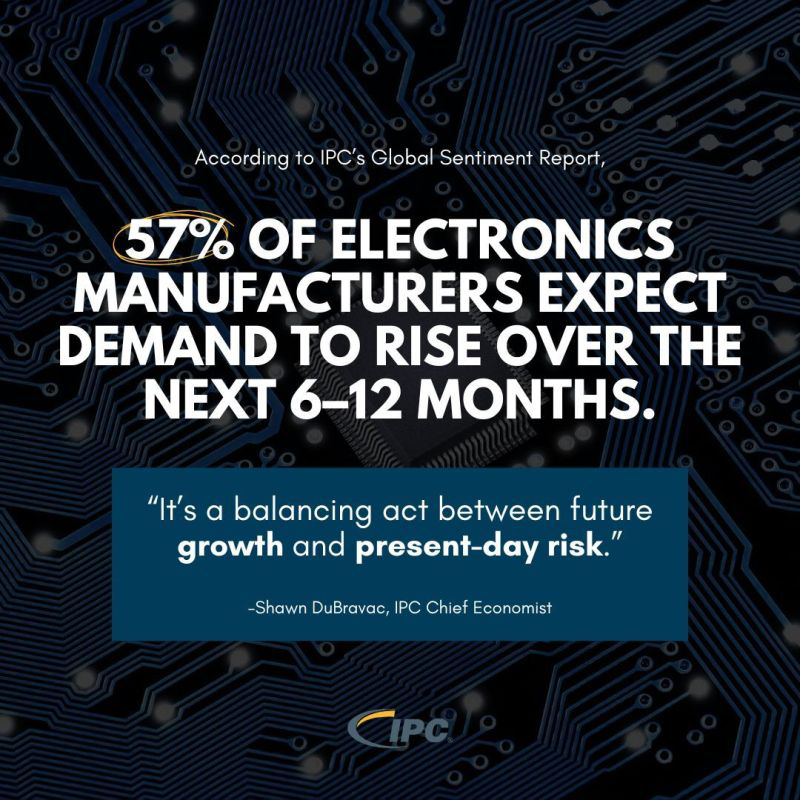 |
Dear [Colleague]:
This week’s headlines delivered another round of tariff turbulence, as higher U.S. duties on steel and aluminum went into effect, while key semiconductor exemptions were extended. IPC has weighed in on the negative impacts of tariffs on our industry, and we will continue to do so.
Also in the United States, the Senate has begun reworking the House-passed “One Big Beautiful Bill,” and the negotiations are already revealing deep divisions over spending, taxes, and more. IPC is watching closely and weighing in as the final deal takes shape.
Meanwhile, a new op-ed from Jim Will of the IPC-affiliated U.S. Partnership for Assured Electronics (USPAE) draws attention to the urgent need for coordinated action to shore up America’s microelectronics supply chain before it’s too late.
And in Brussels, IPC unpacked the European Commission’s latest proposals on sustainability reporting in a well-attended webinar. The main message: Electronics manufacturers worldwide must stay abreast of the evolving compliance landscape.
Keep reading for the full rundown, and as always, let us know how we can support your needs.
Chris Mitchell
Vice President, Global Government Relations
The Headlines at a Glance:
TOP NEWS OF THE WEEK
- Steel and Aluminum Tariffs Take Effect as Semiconductor Exemptions Extended
QUOTE OF THE WEEK
- On the Importance of IPC Member Participation in Advocacy
UNITED STATES
- U.S. Tax and Spending Bill Faces Senate Showdown
- Op-Ed Urges Action to Strengthen U.S. Microelectronics Supply Chain
- Emergency Tariffs Voided, Then Restored on Appeal
- Colorado Executive Order Advances Workforce Innovation
ENVIRONMENT AND SUSTAINABILITY
- IPC Webinar Unpacks EU Sustainability Reporting Changes
OTHER HEADLINES IN THE NEWS
- Reuters | Trump renegotiating Biden-era Chips Act grants, Lutnick says
- Yahoo! News | On High Alert: These States Lead the Charge Against the Manufacturing Crisis
HELP US SPREAD THE WORD ON SOCIAL MEDIA
KEEP IN TOUCH WITH US
 |
Steel and Aluminum Tariffs Take Effect as Semiconductor Exemptions Extended: On Wednesday, U.S. President Donald Trump’s previously announced 50 percent tariffs on imported steel and aluminum officially kicked in. The new duties are expected to raise costs on enclosures, heat sinks, and other metal components essential to electronics manufacturing, intensifying inflationary pressures already felt across the industry.
At the same time, the administration extended a pause on tariffs for certain Chinese-made semiconductors, according to The Hill. The exemption that was originally slated to expire this week has been prolonged to avoid disruptions in chip availability as domestic supply chains remain under development. The decision was welcomed by industry groups, but the fragmented nature of tariff enforcement continues to complicate sourcing and planning for electronics manufacturers.
IPC has weighed in officially on the negative impacts of tariffs on our industry, and we will continue to call for a stable, strategic trade policy that strengthens America’s electronics supply chains. IPC Contact: Richard Cappetto
 |
 |
— Richard Cappetto, IPC’s Senior Director of North American Government Relations, in a recent interview with I-Connect007
 |
U.S. Tax and Spending Bill Faces Senate Showdown: The House-passed “One Big Beautiful Bill Act,” a legislative package of President Trump’s tax and spending priorities, is facing turbulence in the Senate as intra-party disagreements emerge. AP News reports that some Senate Republicans are pushing for deeper federal spending cuts to address the deficit, while others want to preserve or expand business tax incentives, including provisions benefiting R&D and capital investment. Still others are pushing to undo the House bill’s cap on state and local tax (SALT) deductions or to preserve clean energy tax credits originally enacted under the Biden-era Inflation Reduction Act.
Meanwhile, Trump adviser Elon Musk added to the drama by blasting the legislation just hours after his official departure from public service. The GOP discord threatens to splinter support as Senate leaders work to reconcile competing demands. IPC continues to monitor how the package could affect electronics manufacturers. IPC Contact: Richard Cappetto
Op-Ed Urges Action to Strengthen U.S. Microelectronics Supply Chain: In a new op-ed , U.S. Partnership for Assured Electronics (USPAE) Executive Director Jim Will calls for urgent action to strengthen America’s “fragile” microelectronics supply chain. Will argues that the U.S. doesn’t suffer from a lack of innovation or investment, but rather from a lack of coordination, and continued inaction threatens both national security and industrial resilience. The paper outlines five steps to build a stronger foundation: map at-risk components; fund domestic demonstrators; build the full supply chain beyond chips; enable scale through commercial viability; and hold integrators accountable. IPC encourages stakeholders across the industry to join the conversation on how to accelerate solutions. IPC Contact: Richard Cappetto
Emergency Tariffs Voided, Then Restored on Appeal: Last week, the U.S. Court of International Trade (CIT) overturned the sweeping U.S. tariffs imposed under the International Emergency Economic Powers Act (IEEPA), only for an appellate court to reinstate the tariffs within hours. The legal whiplash added yet another layer of uncertainty for manufacturers who were already struggling to keep pace with frequent changes in tariff rates. As Politico reported, the CIT ruling, if upheld, could invalidate the February executive order issued under IEEPA, related to fentanyl and illegal immigration and targeting Canada, Mexico, and China; as well as the April 2 “Liberation Day” executive order, which imposed 10% tariffs across the board. The federal government would be required to halt collection of those duties, and companies could potentially seek refunds under the terms of the judgment. The White House has appealed and may consider invoking alternate legal authorities to maintain its tariff agenda. IPC will continue to provide updates as the situation evolves. IPC Contact: Richard Cappetto
Colorado Executive Order Advances Workforce Innovation: Colorado Governor Jared Polis recently issued an executive order launching a strategy to overhaul the state’s workforce development system. According to an article in Work Shift, the plan aimed to better align education and training with industry needs through stronger cross-sector collaboration, accelerated credentialing, and a unified vision for upskilling across the state. With a strong focus on industry-recognized credentials and regional training partnerships, Colorado’s model reflects many of IPC’s top workforce policy recommendations. As federal and state leaders consider workforce legislation and funding in 2025, IPC urges them to look to Colorado as a great example of policy innovation in action. IPC Contact: Richard Cappetto
 |
IPC Webinar Unpacks EU Sustainability Reporting Changes: On June 5, IPC hosted a timely webinar on the European Commission’s first “Omnibus” package, a sweeping set of proposals aimed at streamlining EU sustainability reporting rules under the Green Deal. The discussion focused on the Corporate Sustainability Reporting Directive (CSRD), the Corporate Sustainability Due Diligence Directive (CS3D), and the evolving EU Taxonomy Regulation. IPC’s Diana Radovan was joined by ESG regulatory expert Pianpian Wang of Anthesis Group and Helena Maripuu of Incap Corporation to outline key implications for the electronics industry. The speakers also discussed steps manufacturers should be taking now to prepare for reporting obligations and investment-related compliance under CBAM and InvestEU. IPC continues to advocate for clearer, harmonized sustainability rules that reflect the realities of global value chains. IPC Contact: Diana Radovan
 |
 |
 |
KEEP IN TOUCH & JOIN OUR EFFORTS Meet the IPC GR Team: Whether it is engaging with policymakers in the Americas, the European Union, or Asia, the IPC Government Relations (GR) Team proactively seeks opportunities to educate, inform and influence policymakers on policies that spur innovation, growth and competition, while protecting human health and the environment. But our success depends on your support and engagement. Learn more and get involved in IPC advocacy today! IPC Contact: Chris Mitchell.
In the U.S., take IPC’s five-minute public opinion survey and contact your elected officials via the IPC Action Alert Center. Peruse our global Advocacy pages on IPC.org or our European pages on IPC.org and LinkedIn. Subscribe to this IPC Global Advocacy Report: If you are a member of IPC, manage your e-mail preferences and opt in to receive all “Advocacy” updates. If you are not an IPC member — or if you are not sure — please send a note to friends@ipc.org, and our staff will add you to the list. See prior editions of Global Advocacy Report. Please contact one of us via the links above if you have any questions or insights to share!
|


